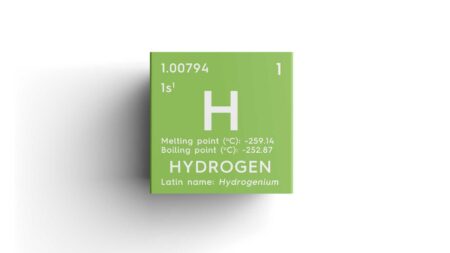Depleted oil and gas reservoirs have long been an essential part of the fossil fuel industry, having served as valuable storage spaces for vast quantities of hydrocarbons.
Now, these reservoirs hold the key to unlocking the potential of hydrogen, a clean and sustainable energy source. A groundbreaking initiative, led by Benjamin Betken from Ruhr University Bochum, is making strides in understanding the viscosity of hydrogen and hydrogen-methane mixtures at the relevant temperature and pressure ranges. This critical research is part of the HYDROGENi project, seeking to explore the feasibility of using depleted reservoirs to store surplus hydrogen for later use, and ultimately drive the transition towards a greener energy landscape.
Hydrogen is gaining momentum as a promising energy carrier, offering emissions-free mobility and a sustainable alternative to fossil fuels. One of the key challenges in adopting hydrogen as a widespread energy solution is efficient storage. Depleted gas reservoirs emerge as a viable solution due to their enormous storage capacity and strategic proximity to existing offshore infrastructure, such as wind farms and oil and gas facilities. Offshore storage is projected to be not only cost-effective but also technically feasible, making it an attractive option for hydrogen storage.
Despite the potential benefits, questions regarding the suitability of depleted reservoirs for hydrogen storage persist. The HYDROGENi project aims to shed light on these uncertainties, including issues related to injection capacity, potential migration, and overall feasibility. The recent focus on viscosity measurements of pure hydrogen and hydrogen-methane mixtures is a significant step towards finding answers to these vital questions.
The groundbreaking viscosity measurements were conducted at the ECCSEL VISC-DENS facility, operated by SINTEF Energy Research. Benjamin Betken, a PhD candidate at Ruhr University Bochum, spearheaded the tests during his research stay at SINTEF. The measurements were the first-ever conducted at the VISC-DENS facility after commissioning and verification tests.
Accurate viscosity data is crucial for the development, improvement, and validation of models for transport properties, including dynamic viscosity and heat conductivity. The results obtained from the VISC-DENS facility are invaluable for better understanding the behavior of hydrogen and hydrogen-methane mixtures under different reservoir conditions.
While the viscosity measurements primarily focused on hydrogen storage, they have wider implications for hydrogen transport as well. In investigating the possibility of utilizing the natural gas grid for hydrogen transport, Benjamin had previously conducted similar measurements at Ruhr University Bochum’s thermodynamics laboratory using rotating-body viscometers. The congruence of data from different measurement techniques is an encouraging sign for advancing hydrogen transport technologies.
The collaboration between researchers, academia, and industry stakeholders is paving the way for a sustainable energy future. As we continue to explore the vast potential of hydrogen, innovative initiatives like HYDROGENi hold the key to unlocking the power of depleted reservoirs and reshaping the global energy landscape.








